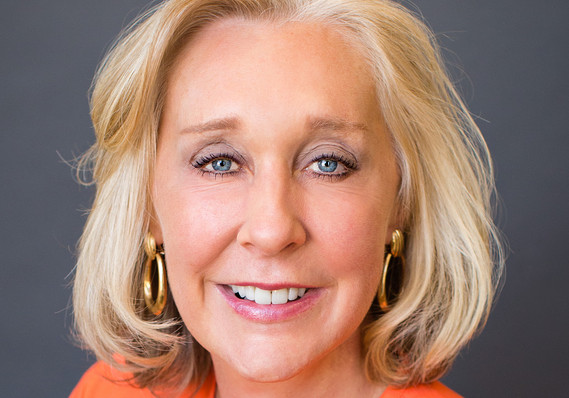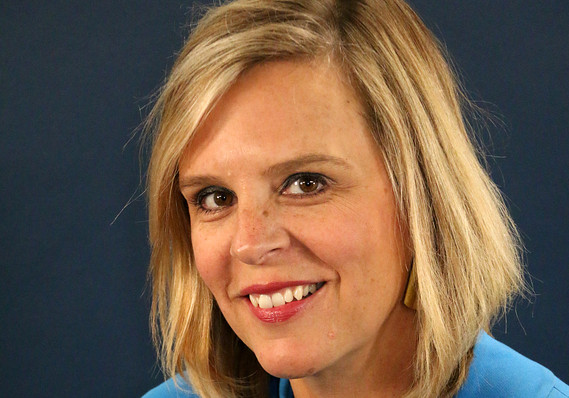The impeachment inquiry’s latest star witness served up a handy reminder that professional women’s anger isn’t always “fully appreciated.”
Fiona Hill, a former National Security Council official and Russia expert, made the point during last Thursday’s hearing in response to a question from Republican counsel Steve Castor. Castor referenced testimony from Gordon Sondland, the U.S. ambassador to the European Union, alleging that Hill had been “upset” regarding the state of affairs in Ukraine.
A raft of academic research suggests that women are under pressure to maintain a cool exterior.
“Very unfortunately, I had a bit of a blowup with Ambassador Sondland, and I had a couple of testy encounters with him,” Hill said. “One of those was in June ’18, when I actually said to him, ‘Who put you in charge of Ukraine?’ And I’ll admit I was a bit rude, and that’s when he told me, ‘The president,’ which shut me up.”
“This other meeting … I was actually, to be honest, angry with him,” she continued. “And you know, I hate to say it, but often when women show anger, it’s not fully appreciated. It’s often pushed onto emotional issues, perhaps, or deflected onto other people.”
Hill’s critique of the anger double standard wasn’t the first time that gender and anger have come under a microscope during a congressional hearing. Palo Alto University professor Christine Blasey Ford, who spoke in measured tones last year about her alleged sexual assault by Supreme Court Justice Brett Kavanaugh nearly four decades earlier, was praised by some for her poise and ability to remain calm as she testified ahead of his confirmation vote.
 Getty Images
Getty Images In sharp contrast, Kavanaugh came out swinging — tearful and angry. He vehemently denied that he assaulted Ford, and when he spoke about his daughters, his voice broke and he choked back tears.
His approach, whether premeditated or not, appeared to have worked. A raft of academic research suggests that women are under pressure to maintain a cool exterior — everywhere from the workplace to academic settings — if they want to get ahead, while men are rewarded for raising their voices and expressing big emotions. The Senate, of course, eventually confirmed Kavanaugh to sit on the nation’s highest court.
‘We’re considered to be difficult when we get angry, whereas men are perceived as being tough and powerful.’
Denise Dudley, a workplace consultant and author based in San Luis Obispo, agrees that there’s a double standard about women and men showing emotion. She has read the research about how women are judged for speaking their minds and asserting themselves, and she has also lived it. Dudley has had firsthand experience losing her cool while having lunch with fellow board members at a university. “One board member we knew to be a blusterer, but he was also a big donor,” she said. The board members were, in other words, used to listening to him talk.
On this day, that wealthy and talkative board member made anti-Semitic comments. No one said a thing. Dudley said she stood up and announced, “I’m leaving,” and walked out of the room in protest. A fellow board member followed her into the bathroom. “The second I looked at her, I burst into tears,” she recalled. “I told her, ‘I’m so angry.’” But in the days that followed, her colleagues’ reaction also shocked her. “I got the same response from everybody: ‘It must have been pretty upsetting, but that’s who he is.’ I got labeled as someone who is thin-skinned and too emotional.”
 Kiwi Ashby
Kiwi Ashby Also see: How many women are accused of sexual harassment?
That group response no longer surprises her. “Women are judged for being emotional,” said Dudley, the author of “Work It! Get In, Get Noticed, Get Promoted.” “We’re considered to be difficult when we get angry, whereas men are perceived as being tough and powerful. I’m going to be labeled as a ball-buster and men are going to be labeled as take-charge.”
She believes this standard was also applied to tennis star Serena Williams’s outburst directed at an umpire during the U.S. Open final last year. “I’m not saying she should have done what she did, but it’s an emotional game,” Dudley said. “At the same time, a double standard was applied. Had she been a male, it wouldn’t have been the same.”
Women in male-dominated workplaces are more likely to say their gender has made it harder to be heard at work.
The same is true in the workplace, as Dudley found. Research shows that men who get angry at work are perceived as strong and decisive, while women are more likely to be regarded as hysterical — and, as such, may show more restraint than their male colleagues.
“Both men and women are held to norms of appropriate emotional expression in the workplace, but emotional expressions by women tend to come under greater scrutiny than those by men,” write the authors of “Constrained by Emotion: Women, Leadership, and Expressing Emotion in the Workplace,” a chapter in the 2016 “Handbook on Well-Being of Working Women.”
Women incur social and economic penalties for expressing stereotypical “masculine” emotions because they threaten society’s patriarchal barriers against the “dominance of women,” researchers Jacqueline Smith, Victoria Brescoll and Erin Thomas wrote in the chapter. At the same time, when women express stereotypical “female” emotions, “they are judged as lacking emotional control, which ultimately undermines women’s competence and professional legitimacy,” the researchers noted.
 Getty Images
Getty Images Also see: U.S. corporate culture must change to create more women leaders
In fact, women employed in male-dominated workplaces are more likely to say their gender has made it harder to be heard at work, and they report gender discrimination at higher rates, concluded a survey released last year by the Pew Research Center, a nonprofit think tank in Washington, D.C. When women express emotion at work, they’re often regarded as weak, said Colleen Huber, director of e-learning design and development at Seattle-based MediaPro, which focuses on cybersecurity and data-privacy threats. And how are men perceived? “They’re showing passion,” she said.
‘Women still use language like, I’m sorry, but… and, I hate to say this, but… A man will just say, That’s a problem.’
Kim Churches, the CEO of the American Association of University Women in Washington, D.C., said women are under pressure to come across as likeable as well as respected. “I have had many times when I’m the only female at the table and someone has looked to me to take care of the housekeeping like pouring the coffee,” she says. It’s harder for women to show their frustration and anger, she added. “Women still use language like, “I’m sorry, but…’ and, ‘I hate to say this, but…’” A man will just say, “That’s a problem, and here’s why…”
This emotional gender stereotyping can work both ways. A majority of men and women (60%) aged 15 to 24 believe that societal and cultural pressures to act masculine prevent men from expressing their emotions in healthy ways, according to a 2018 report, “Diversity, Division, Discrimination: The State of Young America,” released by MTV and the nonprofit Public Religion Research Institute. Young women are more than twice as likely as young men to say they feel stereotypes prevent them from pursuing the things they want to do.

Don’t miss: Why kissing up to the boss is a fool’s errand
Even using one’s voice without any discernible emotion at work can benefit men more than women: Two 2017 studies published in the Academy of Management Journal found that not all voices are equal. Men who spoke up in meetings with ideas and solutions to problems benefited more than women who did the same. “Talking a lot or participating at a high level in a group may not be enough to emerge as a leader,” the researchers wrote. “It also depends how you do it and who you are.” They concluded, “The benefits associated with speaking are more strongly felt for men.”
The studies focused on a four-month training camp at a military academy and an experiment in which 196 people listened to audio recordings with men and women speaking on the phone about selling insurance over the phone. In two separate recordings, men and women pointed out a problem with the process. In another two recordings, men and women pointed out a solution with the process. In the military training camp and the experiment involving a fictitious insurance company, women did not receive any benefits in status or emerge as a leader from speaking up; the men who offered solutions did.
Men who spoke up in meetings with ideas were more likely to be regarded as leaders than women who did the same.
“Managers who want to promote gender equity on their team — or who just want to make sure they are getting as many good suggestions from their team members as possible — will have to pro-actively work to counteract the tendencies uncovered in our research,” Sean Martin, one of the researchers, wrote in the Harvard Business Review. “Women, even when they speak up and ‘lean in,’ still may not get equal credit for doing so. And if that is the case, then it is essential not only for women to speak up but also for those around them to give equal weight to what they say.”
Anne Kreamer, author of “It’s Always Personal: Navigating Emotion in the New Workplace,” recalls being screamed at by a titan of industry on a phone call because the stock of the company she worked for didn’t rise when she sealed a deal. He slammed the phone down after a rage-filled 90 seconds. When he phoned in the middle of their celebration on closing the deal, she mistakenly believed he was calling to congratulate her. “My first response was to shout back, ‘Who do you think you are? How could you reasonably expect this little deal to move the share price?’” But she worked, she said, in a division within a division within a division. So she remained silent.
“Women often cry at work is because they’re angry. Women feel the inability to express anger at work. This is a deeply common phenomenon for almost all women,” Kreamer said. “Anger is seen by some business leaders as an effective management tool. The president of the United States has internalized that on some level.”
But she believes women shouldn’t shout back when they’re screamed at by a man in a position of power — and not just because it would jeopardize their job. Well-chosen words are always better, she said. “Women should articulate their anger so it doesn’t diminish their standing in the organization or their larger workplace ethos.”

Recommended: In America, a shockingly low number of women make it to the C-suite
Dudley, the author and workplace consultant, has seen women lose it at work — and with great effect. When she worked as an administrator at a psychiatric hospital in California, an elderly woman once climbed over a wall in the middle of the night and fell asleep on the other side. The staff searched the perimeter of the hospital in vain. Thankfully, Dudley said, the woman was eventually found unharmed, but not until the following morning. It was a cautionary tale for the staff, and one that could just have easily ended tragically. One female staff member was furious, Dudley recalled.
“This woman was angry. As she was talking, she burst into tears and the whole staff just absorbed it rather than playing with their pencils and looking at their watches,” she said. “I’ve never forgotten that. The emotion that she showed allowed a direct transfer of what she was trying to say into the minds and hearts and souls of everyone who was a caregiver in that room.”
Alas, Dudley says that such an impact is rare. “It was the only time I’ve ever seen emotions work positively for a woman in the workplace,” she said.
(This story was originally published Sept. 10, 2018, and updated Nov. 22, 2019.)










Add Comment